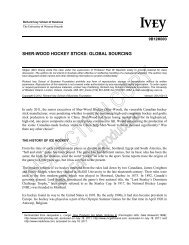foundation of canada asia pacific - Content Tagged with
foundation of canada asia pacific - Content Tagged with
foundation of canada asia pacific - Content Tagged with
Create successful ePaper yourself
Turn your PDF publications into a flip-book with our unique Google optimized e-Paper software.
and colleagues were educated in Canada. Although they are proud and confident <strong>of</strong> their<br />
Asian heritage, they do not want to be pegged as “Asian experts” who are only needed when<br />
there is an Asian business issue to be handled. This stereotyping, which on the surface may<br />
seem positive, can be a career obstacle, psychologically if not materially.<br />
56<br />
It is ironic that non-Asian Canadians who have consciously set out to develop Asian expertise<br />
by studying a language and attending one <strong>of</strong> the Asian business studies courses available<br />
in Canada believe they are <strong>of</strong>ten overlooked by Canadian business. Anecdotal evidence<br />
suggests managers will <strong>of</strong>ten turn instead to Asian Canadians whose claim to Asian<br />
expertise is only a language skill. A group <strong>of</strong> graduates <strong>of</strong> the Asia Pacific Co-operative<br />
Management Program at Vancouver’s Capilano College, who spent time working in Asia,<br />
reported that while employers in Canada appeared to value their functional skills, they<br />
saw no real business benefit in their experience <strong>of</strong> Asia. 6 It was seen by employers as<br />
mostly a “character builder.” On the other hand, non-Canadian companies in Asia were<br />
quick to pick up their services and were prepared to pay a premium for their international<br />
expertise. Some Canadian managers seem to feel that postings in Asia or those requiring<br />
frequent travel to Asia are choice positions that should go to senior employees whose<br />
skill is in knowing their own companies and products, rather than in having a high level<br />
<strong>of</strong> competency in Asian business practices. Alternately, when they think language is a<br />
factor, they hire English-speaking local staff to operate their overseas <strong>of</strong>fices for them.<br />
A survey in 1997 <strong>of</strong> Canadian companies <strong>with</strong> <strong>of</strong>fices in Japan, our largest Asian market,<br />
found that only about 15 <strong>of</strong> the 70 Canadian companies responding had Canadians in<br />
the most senior position. (By contrast, 356 out <strong>of</strong> 450 Japanese companies operating<br />
in Canada had Japanese CEOs.) 7 The survey found that “only a small percentage <strong>of</strong> the<br />
companies surveyed appeared at all interested in hiring graduates produced by [Canada’s<br />
Asian business] programs.” 8 This trend seems to be continuing in Canada, <strong>with</strong> employers<br />
looking to Asian Canadians as the equivalent <strong>of</strong> “local hires.”<br />
BRAIN DRAIN IN THE MAKING<br />
The risk for Canada and the challenge for policymakers is that, as globalization gives<br />
even greater mobility to highly qualified staff, Asian business graduates or Asian Canadian<br />
pr<strong>of</strong>essionals will feel frustrated at home and will seek greater acceptance elsewhere.<br />
(Of course, this concern is not exclusive to pr<strong>of</strong>essionals <strong>with</strong> Asian backgrounds.) There<br />
is already anecdotal evidence <strong>of</strong> some Canadian-educated children <strong>of</strong> Asian immigrants<br />
returning to their parents’ former homelands because <strong>of</strong> a perceived or real lack <strong>of</strong> career<br />
opportunities in Canada. If young Asian Canadians do not feel they are reaching their full<br />
potential in their careers, or Asian business graduates feel their qualifications are overlooked<br />
at home, they may leave Canada, exacerbating the brain drain.<br />
Canada has gained from its ability to attract business immigrants <strong>with</strong> connections to<br />
Hong Kong, Taiwan, China or India. But we cannot forever be confident <strong>of</strong> our attraction<br />
as a future home for these skilled and affluent immigrants. A time will come when we<br />
will have to compete more keenly <strong>with</strong> other countries for educated individuals <strong>with</strong><br />
international business know-how. Instead <strong>of</strong> looking overseas, Canada should start to<br />
look inward to the talented human resource pool already in the country. Among this<br />
group are young bicultural Asian Canadians who are in a unique position to be trained in



